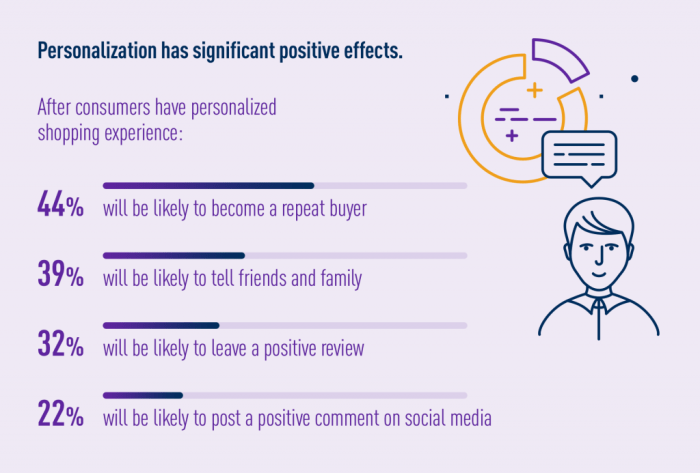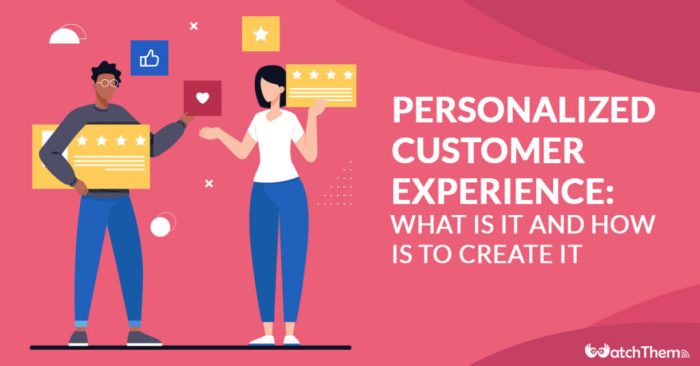Kicking off with Personalizing Customer Experiences, this topic dives into the art of building strong customer relationships through tailored interactions. From enhancing brand loyalty to driving sales, personalization is key in today’s competitive market.
Importance of Personalizing Customer Experiences
Personalizing customer experiences is crucial in today’s competitive market as it helps businesses build stronger relationships with their customers, leading to increased loyalty and retention.
Impact of Personalized Experiences on Customer Loyalty
- Customers feel valued and understood when their preferences are taken into account, leading to a higher level of trust and loyalty towards the brand.
- Personalization creates a unique and memorable experience for customers, making them more likely to return for future purchases.
Successful Companies in Personalizing Customer Experiences
- Amazon: Utilizes personalized product recommendations based on past purchases and browsing history to enhance the shopping experience.
- Netflix: Customizes content recommendations based on viewing history and preferences, keeping customers engaged and satisfied.
Increased Customer Satisfaction and Retention through Personalization
- By tailoring products or services to meet individual needs, businesses can ensure higher customer satisfaction levels and reduce the likelihood of churn.
- Personalization also allows companies to anticipate customer needs and provide proactive solutions, enhancing overall customer experience.
Strategies for Implementing Personalization

In order to effectively personalize customer experiences, it is essential to utilize various strategies that focus on collecting customer data, leveraging AI and machine learning, and tailoring products or services based on individual preferences.
Different Methods for Collecting Customer Data for Personalization
- Utilize customer surveys and feedback forms to gather insights directly from customers regarding their preferences and needs.
- Implement tracking tools on your website to monitor customer behavior, such as pages visited, time spent on site, and items viewed.
- Utilize social media listening tools to analyze customer interactions and sentiment towards your brand.
- Utilize loyalty programs and customer accounts to track purchase history and preferences.
The Role of AI and Machine Learning in Creating Personalized Customer Experiences
AI and machine learning play a crucial role in analyzing large sets of customer data to identify patterns, trends, and preferences. By utilizing these technologies, businesses can automate the process of personalization and deliver more relevant recommendations and offers to customers based on their behavior and interactions.
Tips on How to Tailor Products or Services Based on Individual Preferences
- Utilize recommendation engines to suggest products or services based on past purchases and browsing behavior.
- Implement dynamic pricing strategies to offer personalized discounts or promotions to customers based on their preferences and behavior.
- Personalize email marketing campaigns by segmenting customers based on their preferences and sending targeted content.
- Offer customization options for products or services to allow customers to create personalized experiences based on their individual preferences.
Benefits of Personalizing Customer Experiences
Personalizing customer experiences can have a significant impact on a business’s bottom line. By tailoring interactions to individual preferences and behaviors, companies can see improvements in various areas.
Improved Conversion Rates
Personalized experiences can lead to higher conversion rates as customers are more likely to engage with content that is relevant to their needs and interests. By delivering personalized recommendations and offers, businesses can guide customers through the purchasing journey, increasing the likelihood of conversion.
Role of Personalized Recommendations in Driving Sales
Personalized recommendations play a crucial role in driving sales by suggesting products or services that align with a customer’s past behavior, preferences, and purchase history. This not only helps customers discover new items they might be interested in but also increases the chances of making a purchase, ultimately boosting sales revenue.
Enhanced Brand Loyalty and Customer Lifetime Value
Personalization can also enhance brand loyalty and customer lifetime value by creating a more personalized and engaging experience for customers. When customers feel understood and valued by a brand, they are more likely to develop a sense of loyalty and continue to engage with the business over time. This can result in repeat purchases, higher customer retention rates, and increased customer lifetime value.
Technologies for Personalizing Customer Experiences

Customer experience personalization is made possible through various technologies that enable businesses to tailor interactions based on individual preferences and behaviors.
Customer Relationship Management (CRM) Systems, Personalizing Customer Experiences
CRM systems play a critical role in personalizing customer experiences by consolidating customer data from various touchpoints. This centralized data allows businesses to gain insights into customer preferences, purchase history, and behavior patterns. By leveraging this information, businesses can create targeted marketing campaigns, personalized recommendations, and customized communications that resonate with individual customers.
Data Analytics Tools
Data analytics tools are essential for understanding customer behavior and preferences. These tools enable businesses to analyze large volumes of data to identify trends, patterns, and correlations that can be used to create personalized experiences. By leveraging data analytics, businesses can segment customers based on their preferences, predict future behavior, and make data-driven decisions to enhance the overall customer experience.
Automation and Chatbots
Automation and chatbots are valuable tools for delivering personalized interactions in real-time. Chatbots can be programmed to engage with customers, answer inquiries, provide product recommendations, and offer personalized assistance based on customer data. Automation tools enable businesses to streamline processes, send personalized messages at scale, and deliver timely responses to customer queries. By combining automation and chatbots, businesses can create seamless and personalized customer experiences that drive engagement and loyalty.
Challenges in Personalizing Customer Experiences
Implementing personalization strategies in business comes with its fair share of challenges. From technological limitations to privacy concerns, businesses often face obstacles that can hinder their efforts to provide personalized customer experiences. Let’s dive into some common challenges and ways to overcome them effectively.
Privacy Concerns and Impact on Personalized Marketing
Privacy concerns play a significant role in how businesses can implement personalized marketing efforts. With the increasing focus on data privacy and regulations such as GDPR, businesses need to navigate carefully to ensure they are not infringing on customers’ privacy rights. This can impact the way businesses collect and utilize customer data for personalization purposes.To overcome privacy concerns and maintain trust with customers, businesses should prioritize transparency in their data collection practices.
Providing clear information on how customer data is being used and giving customers control over their data can help alleviate privacy concerns. Additionally, businesses can implement robust data security measures to protect customer information from unauthorized access.By addressing privacy concerns head-on and demonstrating a commitment to data protection, businesses can build trust with customers and create a solid foundation for personalized marketing efforts.
Case Studies on Personalizing Customer Experiences
In today’s competitive business landscape, personalizing customer experiences has become crucial for companies looking to stand out and build strong relationships with their customers. Let’s take a closer look at some case studies that highlight the impact of personalization on customer satisfaction.
Successful Case Study: Amazon
Amazon is a prime example of a company that has successfully implemented personalization to enhance customer experiences. By leveraging data analytics and AI, Amazon provides personalized product recommendations, tailored marketing messages, and customized shopping experiences based on each customer’s browsing and purchase history. This level of personalization has significantly improved customer satisfaction, leading to increased sales and customer loyalty.
Companies that Failed to Personalize Customer Experiences
One example of a company that faced consequences for failing to personalize customer experiences is Blockbuster. As Netflix rose to prominence with its personalized movie recommendations and convenient streaming services, Blockbuster’s lack of personalization and failure to adapt to changing customer preferences ultimately led to its downfall. The company filed for bankruptcy in 2010, highlighting the importance of personalization in staying relevant and meeting customer needs.
Real-world Examples of Personalization Strategies
Starbucks is another company that has excelled in personalizing customer experiences. Through its mobile app, Starbucks offers personalized drink recommendations, rewards, and promotions tailored to individual preferences. By leveraging customer data and technology, Starbucks has successfully implemented personalization strategies that drive customer engagement and loyalty.
